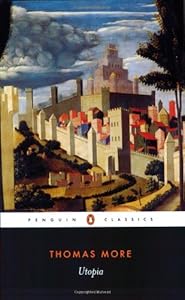 Cover of Utopia (Penguin Classics)Thomas More's Utopia has been on my reading list for quite some time. Being particularly interested in dystopic fiction (Zamyatin's We, Milton's Paradise Lost, and Orwell's 1984 as examples), it was of course of interest to me to go to the original source of dystopia and go directly to the author and text known as Utopia. Utopia can be found at Gutenberg.org for free!
Cover of Utopia (Penguin Classics)Thomas More's Utopia has been on my reading list for quite some time. Being particularly interested in dystopic fiction (Zamyatin's We, Milton's Paradise Lost, and Orwell's 1984 as examples), it was of course of interest to me to go to the original source of dystopia and go directly to the author and text known as Utopia. Utopia can be found at Gutenberg.org for free!Utopia is said to be derived from Plato's Republic. It has been a long time since I read the Republic, so I'll have to take the general consensus for granted, as I won't be reading it again in the near future. It is basically a one sided conversation where someone relates a description of this Utopian civilization to More. I wouldn't be surprised if the reason for this is so that none of the religious nut-wings could burn him as a heretic for writing this.
The most interesting part of Utopia was the religious organization of the Utopians. They had temples, and at the temple every religious sect of the society would go to worship. The temples themselves lacked any sort of decoration, symbols, or other indications that would be pertinent to a particular belief. It is said that the worshippers of the planets were allowed to pray alongside those who worshipped Jesus. However, it can be said that More put down atheist leanings when he said that those who lacked faith had no sense of morality and would do all manner of bad things. Nonetheless, there is a fairly heavy push to suggest that the Utopians were very accepting and even enthusiastic about the adoption of Christianity.
However, for the most part, it sounded very dystopian to me. The fashion of the day is that everyone wears exactly the same clothing as the next. The value of gold is flipped around so that it becomes the substance which encumbers the slave class. Diamonds and other gems are the playthings of young children that are later forgotten as they mature.
A strong link could be made between the ideals of Communism and the ideals portrayed in Utopia. That is not to confused the communism of the former USSR or any other rendition of the ideal. For, the prince himself of Utopia wears the same clothing as every Utopian. His home is the same as any other. Every home is virtually the same. Every four years, there is a rotation where everyone moves into a different home. Of course, in the USSR, leaders lived quite well. Even eating is generally done socially. People eat in some kind of communal dining room. The food is prepared by women who are on rotating shifts, as well as they're responsible for the cleaning.
Basic labour is divided equally among almost all. Each member of the society must help with agriculture. Nearly everyone is required to work for two years on the farms which nourish the cities.
Negative aspects include that in order for one to travel between cities, one must first obtain permission from the prince. The few offences are often severely punished with slavery. Some offences would include adultery and travelling without papers. There also seems to be a lot for the feminist to be desired. Women have their place, and it's not on equal footing with men.
I would not want to live in this Utopian society. In fact, I would have to say that everyone's version of Utopia is likely another's dystopia.

No comments:
Post a Comment